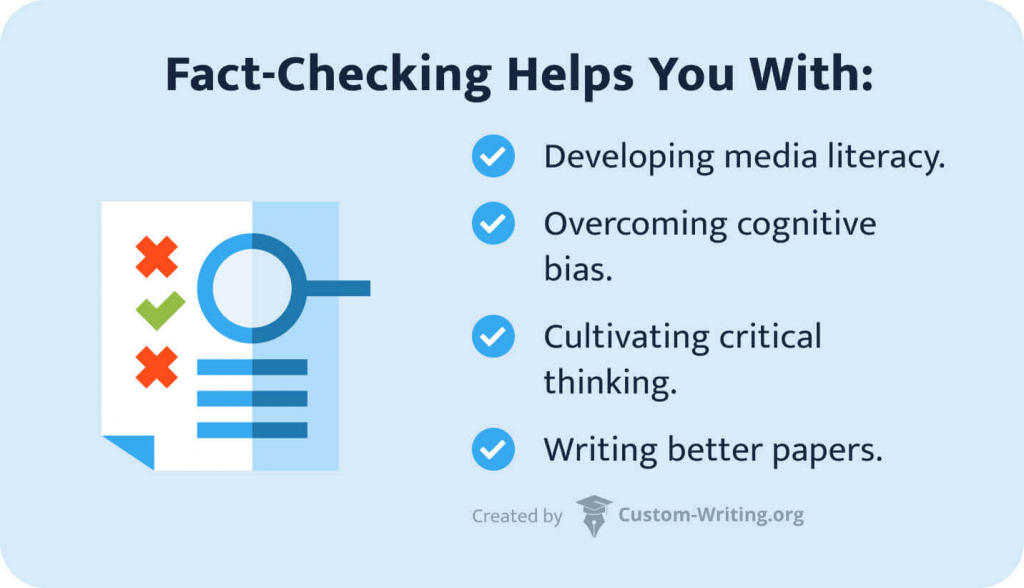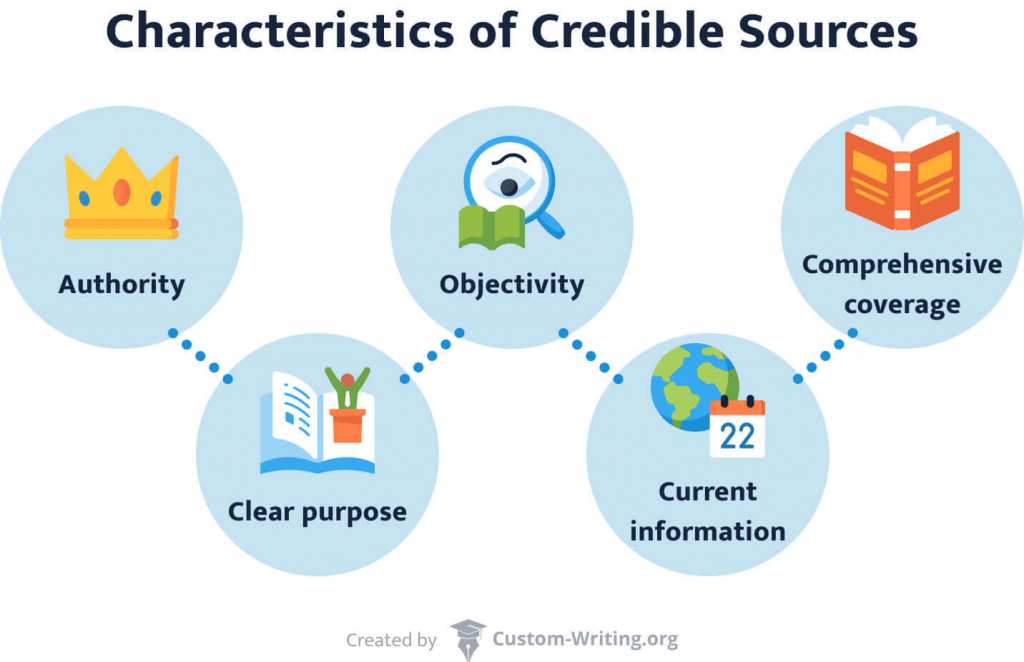Imagine you’ve just written a paper. You’re going to proofread it, right? But is proofreading enough to ensure the absence of any factual errors or unfounded conclusions? Can you say with 100% certainty that you cited every reference correctly?

If you want to learn how to fact-check like a pro, keep reading this article! Our custom-writing team will tell you the best way to review your papers.
🤔 What Is Fact-Checking, and Why Is It Important?
As you may have already deduced, fact-checking is the skill that helps you distinguish between trustworthy and sketchy information sources. We live in a time in which everyone is a self-proclaimed authority on every topic, so navigating the ocean of “facts” is no easy task. That’s where fact-checking comes into play.
More often than not, fact-checking is associated with journalism, but it is just as crucial for students. Here’s why:
- It helps you develop media literacy. Getting experience in fact-checking means that the overabundance of fake news will no longer confuse you.
- It aids in overcoming your own cognitive bias. When you look at information through the lens of your own experiences, your brain inevitably distorts it to conform it to your beliefs. Learning to fact-check is a way to avoid this common mental trap.
- It develops critical thinking. Do you want to become more objective, see the difference between facts and opinions, and avoid media manipulation? If you do, you have to question everything you read instead of taking it at face value.
- It helps you write better papers. Your writing will contain no inaccuracies and arrive at more well-supported conclusions. If you want to know how to achieve it—keep reading!
✅ Fact-Checking Basics for Students
You’re likely aware of the need to proofread every paper for grammatical mistakes before handing it in. But your assessment shouldn’t be limited to grammar only. Checking your facts is crucial if you want to produce credible work, especially if you draw your own conclusions, rely on your memory, or work with secondary sources.
What to Fact-Check
Here’s a little fact-checking checklist to facilitate the process. Watch out for the following:
- Names of people and characters. Is it Barak Obama or Barack Obama? Samwise Gamgee or Samwise Gamgy?
- Names of businesses and organizations. Nordstrom or Nordström? The American educational organization GLSEN is pronounced glisten, so make sure you don’t confuse the spelling with the pronunciation.
- Dates and years of life. Did Jackson Pollock die in 1956 or 1957? Don’t rely solely on your memory—check the facts.
- Names of literary works, articles, and magazines. Make sure you don’t accidentally omit words from the title of The Guernsey Literary and Potato Peel Pie Society by Mary Ann Shaffer and Annie Barrows. And double-check the spelling!
- Percentages and other numbers. How many left-handed people are there in the world? Is it 12% or 9%? Oh wait, it’s actually 10%.
- Quotes. Do you really think that Albert Einstein told us not to believe everything we read on the Internet? Well, if he did—he was right.
- Wording. When a website says that the Cavendish is the only edible type of banana in the world, you might want to verify that. Spoiler alert: it’s not.
How to Fact-Check
There are a few things you could do while proofreading to facilitate fact-checking:
- Ask yourself these questions: Who said this? How do they know? Are they biased? What might have been left out?
- Don’t let your confirmation bias get the best of you. Look for evidence for and against anything you assume to be correct by default or to which you have a strong emotional reaction.
- Take a break, and then reread your paper. Once you’ve slept on it, you can view the text in a different light and catch things you could have missed at first. Changing the font can also help you notice your errors.
- While proofreading, try highlighting all numbers, proper names, and facts. Your next step will be to double-check all these things. You can even print the text out and use highlighter markers for more convenience.
- Your own arguments deserve even more attention. Is there an actual confirmation, or have you just jumped to conclusions? Naturally, you don’t want to hand in a paper that’s based on flimsy arguments and invalid assumptions.
- Another tool is a simple gut check. Does it sound right, or does it feel a little off? If something looks unsubstantiated and there’s nothing you can do about it, get rid of it. Better safe than sorry.
🔍 Fact-Checking Your Resources
Working with resources implies checking their reliability and credibility. They’re great for researching and fact-checking what you’ve already written.
What Makes a Source Credible
Checking credibility is especially important if your resources involve Internet websites. The following are characteristics of trustworthy pages:

- Authority. All the authors writing for the site have deep knowledge of their field and credentials that support this.
- Clear purpose. The aim of the resource must be to inform its readers. For example, if the goal is to convince or entertain, it is likely more biased than purely informative sites. More biased means less dependable.
- Objectivity. The more objective your source is, the better. Any effort to persuade the reader or influence them emotionally lowers their level of credibility.
- Current information. You want clear, up-to-date information. Don’t settle for anything less. Changes happen quickly, and your source may be spreading wrong or obsolete information without even knowing it.
- Comprehensive coverage. Another way to assess the reliability of any site is to check how in-depth their coverage of any given topic is. If they publish for the sake of publishing, they are not the source you want to use to support your claims.
How to Spot a Credible Source
Now you know how to distinguish between a trustworthy and an untrustworthy resource. But can you recognize a good one when you’ve come upon it? Here are a few tips:
- Check the domain. You can find the most accurate information on websites with .gov (government) and .edu (education) domains.
- Check the authors of the articles on the site. Your best choice will be authors with credentials such as Ph.D. or MD.
- Check the sources. Does the article list any reliable references that support the author’s conclusions? It’s a good idea to find them, even if the author you’re reading has credibility.
- Check the publication date. This is a great way to ensure the information is current. Sometimes you can come across the “last updated” date, which is also good.
- Look for additional sources. Can you find anything stated in this source on other credible websites? If you can’t, or if it’s contradicted somewhere—find something better.
- Check the tone. You are looking for a neutral source devoid of excessive outbursts of emotion.
🔝 Top 5 Websites for Fact-Checking
Now we’d like to provide you with a short list of websites for fact-checking. You can use them to look up information and find out if it’s true or not. These sites are nonprofit and nonpartisan, which means they don’t take sides. Here we go:
1. FactCheck
This one belongs to the University of Pennsylvania and checks all things political. It is the right place if you want to verify the accuracy of something a politician has said in an interview or debate.
What you should know:
- The navigation is excellent. You can browse by month, location, person, and other categories.
- You can ask the team to fact-check a suspicious claim you’ve come across.
2. Politifact
As you might’ve guessed from the name, Politifact fact-checks political issues. Its mission is similar to FactCheck’s in that it seeks the truth and exposes any nonsense told by politicians.
What you should know:
- It’s another site with easy navigation. Again, you can browse by state edition, issue, and person.
- There’s a fun truth-o-meter, which ranges from “truth” to “pants on fire.”
3. ProPublica
ProPublica is all about investigative journalism. It has even won a few Pulitzer Prizes.
What you should know:
- The topics are not limited to politics. There are also articles on racial injustice and technology, among many others.
- You can download and purchase datasets on several topics if you happen to be interested in them. For example, these datasets include information on the Trump Administration, doctors, and loans.
- Not all datasets are free to download; some cost a few thousand dollars. But bear in mind—they’re very extensive.
4. Snopes
Snopes claims to be the oldest fact-checking site, dating back to 1994. They write about many things, including politics and urban legends.
What you should know:
- BBC News holds Snopes in high esteem.
- They list all the sources they use to produce their material. You can trace the process of their fact-checking work and conduct your own investigation.
- The navigation may not be as excellent as on some other sites, but it is still decent.
5. The Sunlight Foundation
The Sunlight Foundation’s primary goal is to make the government more transparent.
What you should know:
- There’s 15 years’ worth of material on technology, policy, and investigations—the three main sections on the Sunlight Foundation blog.
- Unfortunately, since September 2020, they no longer operate, and the site can only be used as an archive.
We hope that our fact-checking tips will come in handy. Don’t forget to be skeptical, and don’t let your imagination run away with you. We hope you knock it out of the park with your next paper! Do you have your favorite fact-checking methods? Share in the comments!
🔗 References
- Fake News, Misinformation, & Fact-Checking: Ohio University
- “Fake News” & Misinformation: University of Tampa
- How to Fact-Check an Article You Wrote—Like a Pro: The Write Life
- What are Credible Sources?: USC Library
- What Makes Information Reliable?: Austin Community College District
- Step-by-Step Guide & Research Rescue: Evaluating Credibility: BYU Library








![Changing Career Paths after Graduation… or Later [Guide + Infographic]](https://custom-writing.org/blog/wp-content/uploads/2021/09/Changing-Career-Paths-after-Graduation-or-Later-284x153.jpg)
![Being a Successful Online Student: 6 Must-Have Skills [Infographic]](https://custom-writing.org/blog/wp-content/uploads/2021/09/Being-a-Successful-Online-Student-284x153.jpg)

![Meeting Deadlines: A Comprehensive Guide [Tips & Infographic]](https://custom-writing.org/blog/wp-content/uploads/2021/07/flat-lay-desk-calendar-clock-284x153.jpg)